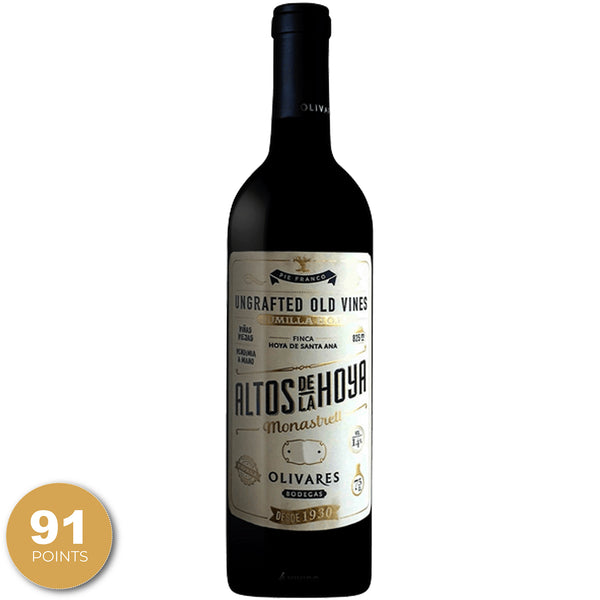Bodegas Olivares, Altos de la Hoya, Ungrafted Old Vine Monastrell, Jumilla, Murcia, Spain, 2021
Shipping calculated at checkout
5 in stock
Note: We will roll into the 2022 vintage once 2021 runs out.
Overview of the Wine
Jumilla was one of the few places in Europe spared during the Phylloxera epidemic of the late 1800's. Virtually everywhere else on the continent, vineyards were devastated and, to this day, can only be planted when grafted onto American rootstock.
For Jumilla, the key to its vineyards' survival was their sandy soil—which is anathema to the Phylloxera insect. As a glorious consequence, Jumilla not only has some of the oldest vines in the world, but also the largest number of ungrafted vines. Most of these vines are Mourvèdre, or Monastrell as it is locally known, one of the most prized varieties of Mediterranean Europe. And Jumilla's summers boast hot days and cool nights, perfect for ripening grapes, while maintaining acidity.
Today, Jumilla is awakening to its vast potential, and a winemaking revolution has followed — led by growers like Olivares' Paco Selva. He owns 65+ hectares of ungrafted old vineyards in the northern part of the appellation, called La Hoya de Santa Ana. It is the coolest sub-zone of Jumilla, with sandy, lime-rich soils that yield intensely aromatic wines, while protecting the ungrafted vines from Phylloxera.
Monastrell is our region’s classic variety and with Altos de la Hoya we aim to capture its essence. Each harvest, we select from our top lots, utilizing only wild yeasts for fermentation.
Winemaker
Paco Selva
Grape/ Blend
90% Monastrell, 10% Grenache
Origin
Jumilla, Murcia, Spain
Winemaker's Tasting Notes
Deep ruby. Ripe, powerful aromas of red and dark fruits, minerals and spices. Finishes fresh and long, with a repeating dark fruit note.
Fruit is sourced from an 60 hectare vineyard of ungrafted vines many of which were planted in 1872. The vineyard is referred to as Finca Hoya de Santa Ana and this bottling comes from the best parcel and the highest point so they call it Altos de la Hoya... meaning the "highest from La Hoya".
91 Points - Robert Parker's Wine Advocate
The 2021 Altos de la Hoya is a varietal Monastrell from dry-farmed vines on poor limestone-rich soils with some 5% Garnacha in the blend. It has notes of ripe berries, aromatic herbs and an earthy touch and a round palate with juicy fruit and fine tannins. It's very pleasant and fresh.
Free Local Delivery
Available for orders $100+ within 25 miles of Downtown Los Angeles, CA. View details










